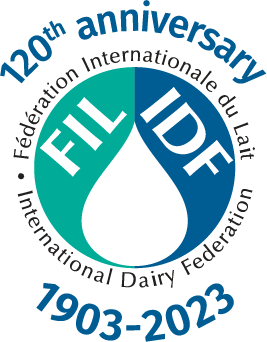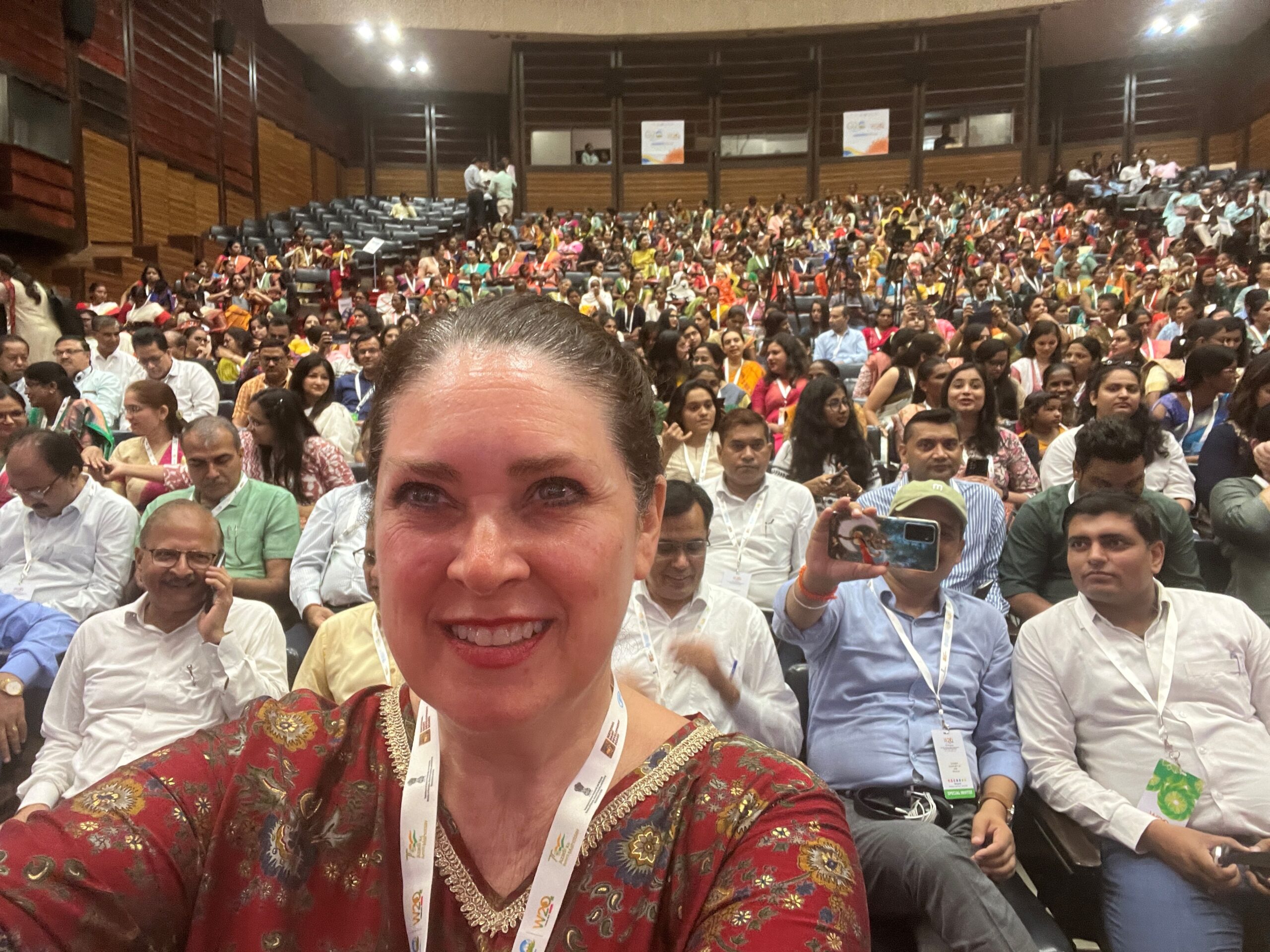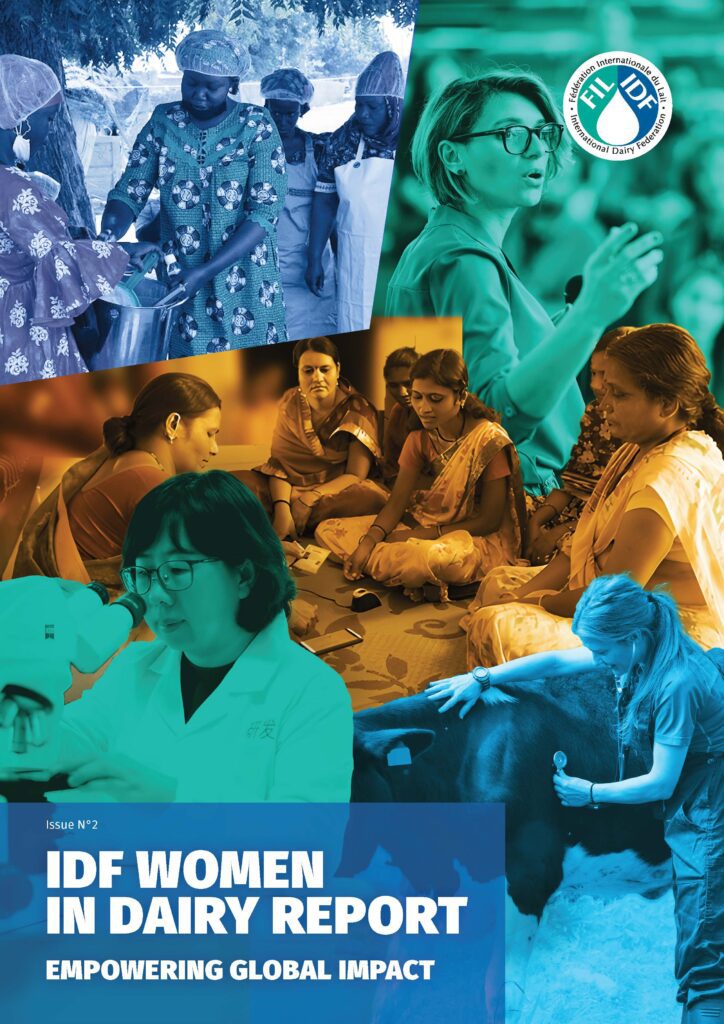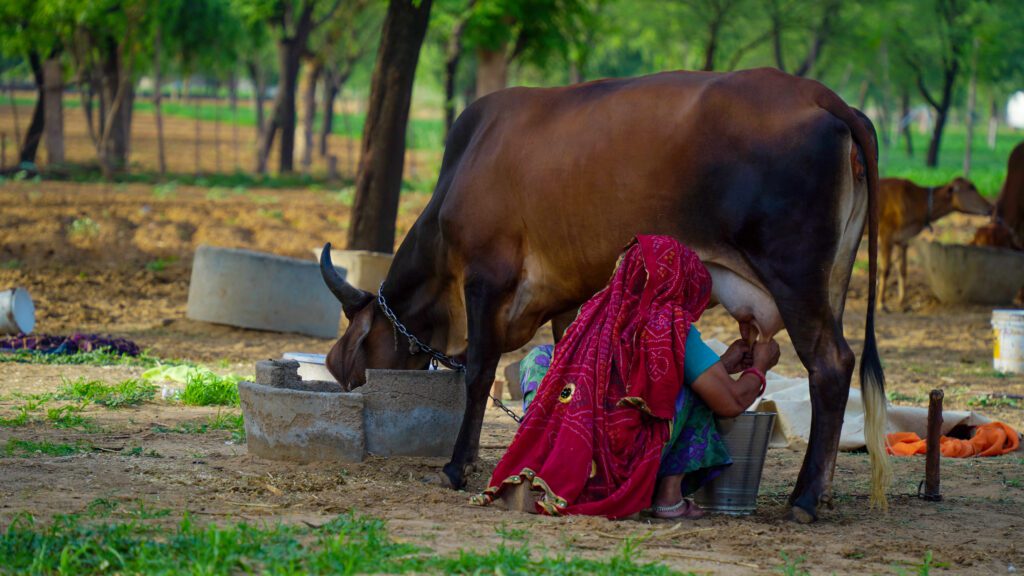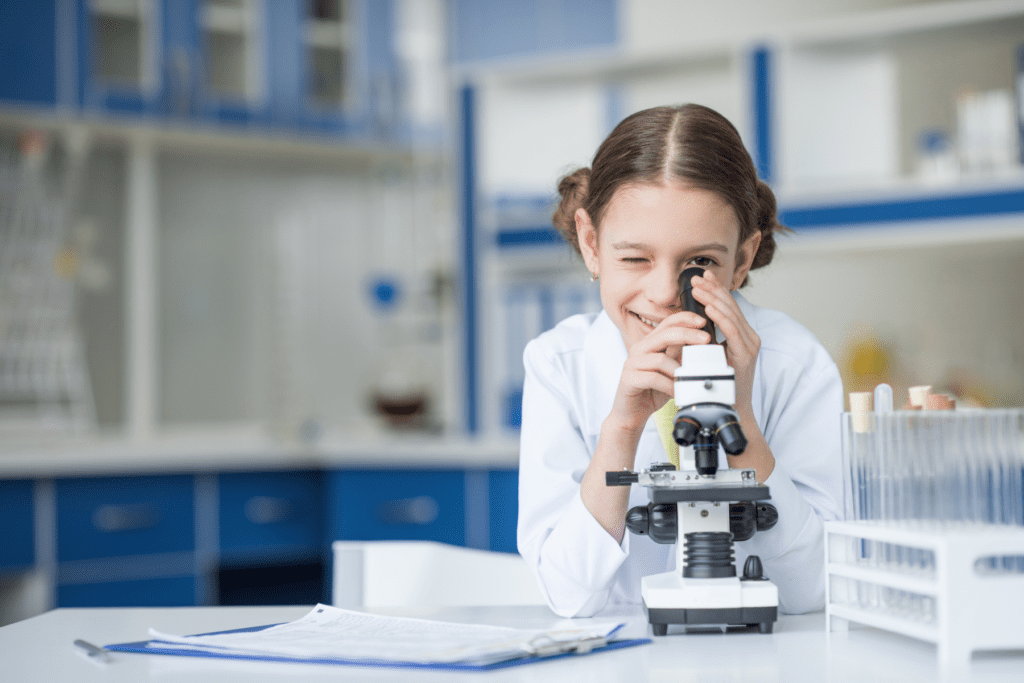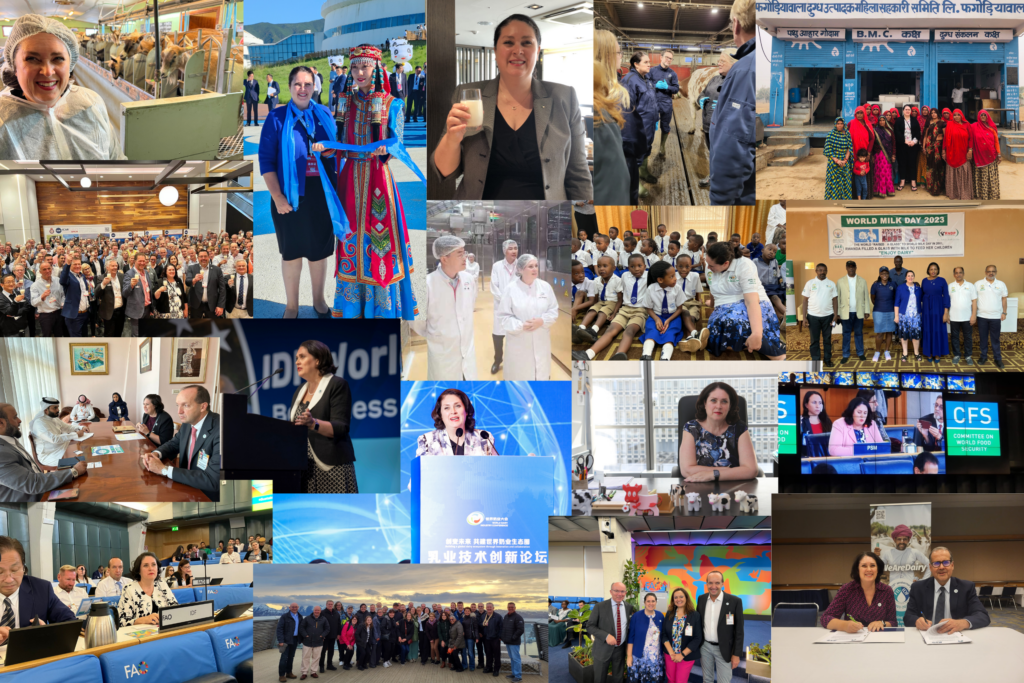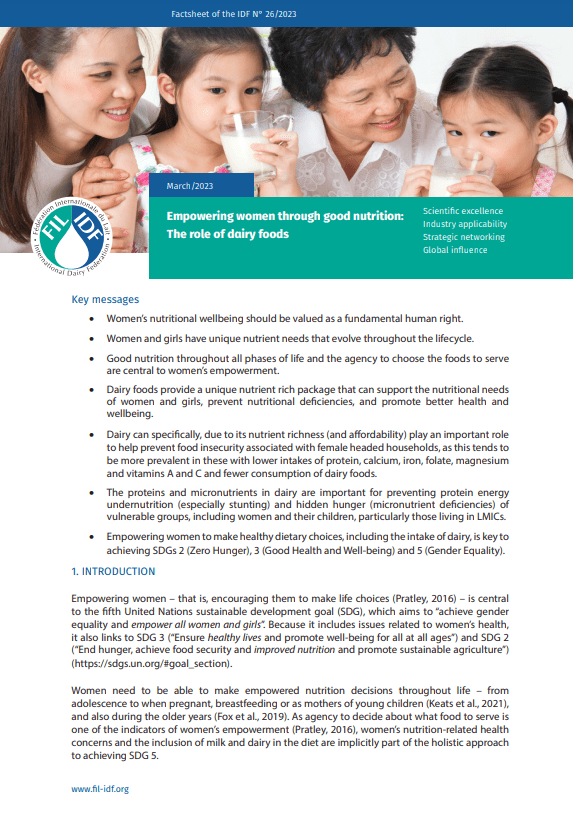Women and Dairy
As food systems are facing a triple challenge of:
1) ensuring food security and nutrition for a growing population
2) supporting the livelihoods of millions of farmers and others in the food chain, and
3) doing so in an environmentally sustainable way, women are already part of the solution.
In my role as DG of IDF, I can testify that the global dairy sector is strongly committed to deliver on the UN Sustainable Development Goals for the benefits of people and the planet including SDG5: to achieve gender equality and empower all women and girls. Our sector is proactive and dynamic in pursuing this goal.
Today, I would like to talk to you about “Women and Dairy”. I had the privilege to participate at a W20[1] conference titled: Women-led Sustainable Development through Dairy Cooperatives, Gujarat, India, on July 20th. I was deeply moved by the view of that auditorium packed with several hundreds of strong and powerful women with whom I had the opportunity to share IDF’s journey with women and dairy. I spoke about the role of dairy in women empowerment as well as recognizing and strengthening female leadership in the global dairy sector.
Here are few of my points.
Role of dairy in empowerment of women
For generations, the dairy sector has been contributing to the empowerment of women both from nutrition and livelihood perspectives.
Nutrition
- Milk and dairy foods improve nutrition of girls and women at different stages of their life.
- Women need to be able to make empowered nutrition decisions throughout life – from adolescence to when pregnant, breastfeeding or as mothers of young children, as well as during the older years.
- Dairy products provide important components for maintaining bone strength, namely minerals such as calcium, phosphorus, magnesium and zinc, vitamin D (especially in countries with relevant fortification) and protein. Milk and dairy protein also play a role in combatting age-related muscle decline.[2]
Socio-economic
- Milk production supports the livelihood of millions of women and their families as we as create socio-economic value for rural communities.
- Women dairy farmers around the world are acquiring financial autonomy (revenue, animals and land ownership) which will contribute to child education and housing, among others.
- Women in the dairy sector are empowered in leadership and governance positions.
- Dairy farming increases/diversifies family incomes, especially in developing countries.
- Increases the understanding of food choice and the necessity of food availability through educational efforts, such as school milk programs.
- Empowers women to make decisions, and specifically about nutrition,
- Brings dual benefits: it improves women’s lives and, in turn, conveys tangible benefits for their children’s development.
FAO. 2023. The status of women in agrifood systems.
- Agrifood systems are a major employer of women. Globally, 36% of working women and 38% of working men work in agrifood systems as of 2019.
- Agrifood systems are a more important source of livelihood for women than for men in many countries. In southern Asia, women overwhelmingly work in agrifood systems (71% of women, versus 47% of men), although fewer women than men are in the labour force.
- Women are more likely to control less-profitable livestock breeds (poultry and small ruminants).
- Women tend to be responsible for day-to-day animal care and management and processing of animal products, while their roles in marketing of animal products can vary substantially by product and context.
- Women are more likely than men to keep locally adapted livestock breeds; they are seen as preservers of livestock diversity.
- Food insecurity impact women more.
Dairy contributes to address malnutrition and nutrition security
More than 800 million people are suffering from hunger on our planet. This hunger includes chronic food deprivation and malnutrition in the form of nutrient and micronutrient deficiencies as well as shortfalls in vitamins and essential metals.
The majority of these people live and mostly in rural areas in low- and middle-income countries They largely depend on agriculture and livestock.
Dairy substantially contributes to eradicating hunger (SDG 2) and recognizing the role that milk and dairy foods play in providing balanced, healthy and safe nutrition is crucial.
IDF’s contributions to SDG5
In 2022, we decided to create an IDF Task Force on Women in Dairy with the objectives of:
- filling up the gap in facts and stories on the place of women in all aspect of the dairy value chain and on the contribution of dairy on women empowerment.
- Showcasing that IDF is also a source of inspiration and role models for the contribution of women into science, agriculture, and food sector.
- Pointing out that IDF offers a wide and rich worldwide network to support and develop their expertise and careers to women.
On March 8, 2023[3], IDF hosted a virtual roundtable on the International Women day. Key highlights:
- Dairying has been a traditional family activity in India and women have been the bedrock of Indian Dairy Sector – Nearly 70 per cent of the work in dairying is contributed by women.
- Dairying has proven to be a tool for socio- economic empowerment of women and also in developing leadership qualities.
- Women helps women and support communities.
- We must tap into the full pool of talent.
- Workplaces that work for women work for everyone!
IDF celebrates every year, the International Day for girls and women in science and International Women Day. We showcase the work of our dairy experts to inspire others: from farmers to nutritionist, responsible of laboratory, food scientists, veterinarians.

Upcoming next
1st IDF Women in Dairy Roundtable on October 15 in Chicago.
The Roundtable will focus on the role of science and technology in helping to empower women in dairy. It will ensure knowledge sharing, inspiration and women network. On this occasion, we will also launch a peer-to-peer network, as well as the first edition of the women in dairy report that will compile initiatives which empower women and girls and showcase the many efforts that the Global Dairy sector is making in all regions of the world throughout the dairy value chain, from the farm to processing, research and education.
Moreover, IDF Dairy Innovation Awards 2023 has introduced a new category for innovation in women empowerment in the dairy sector. We have received very interesting entries (finalists have just been announced). We look forward to knowing the winners on October 16 at the IDF World Dairy Summit in Chicago, USA.
For 2024, we are planning a virtual event on International Women’s Day as well as the launch of a Women in Dairy Information Hub on IDF’s website.
[1] The Women 20 (W20) is an official G20 engagement group established during the Turkish presidency in 2015. The objective is to ensure that the gender considerations are mainstreamed into G20 discussions and translate into the G20 Leaders Declaration as policies and commitments that foster gender equality and women’s economic empowerment.
[2] For more information, consult: IDF Factsheet: DAIRY IN THE NUTRITIONAL EMPOWERMENT OF WOMEN
[3] Technical Webinar: Celebrating women in dairy through engaging case studies – YouTube
